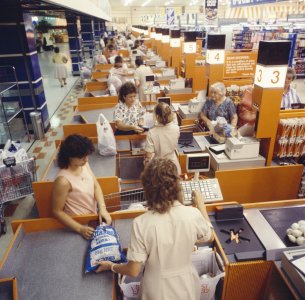This simple photo taken at a supermarket checkout ignited a massive debate—see why it's causing such an uproar!
A single photograph can evoke nostalgia, stir emotions, and even spark a heated debate, as evidenced by a recent online uproar among Australians.
The image in question, a throwback to a Coles supermarket in the 1980s in Belmont, New South Wales, has become the centre of a contentious discussion about the changing face of grocery shopping and customer service.
The photo, shared in a Facebook group dedicated to Australian retail nostalgia, captured a time when full-service checkouts were the norm, with rows of cashiers attending to customers' needs.
It was sourced from the State Library of Victoria and dated sometime between 1980 and 1989, showing a bustling grocery scene with each register operated by a neatly dressed cashier—a sight that has become increasingly rare in today's supermarkets.
The rise of self-service checkouts, which began to appear nearly a decade ago, has been met with mixed reactions from the public.
While some shoppers appreciate the convenience and speed of scanning their items, others lament the loss of personal interaction, the perceived decline in customer service, and retail jobs lost by Aussies to machines.
The photograph from Coles has reignited this debate, with many Australians expressing a longing for the 'good old days' of old-fashioned service.
‘That’s a very rare sight these days. I hardly ever see a register open anymore,’ one social media user wrote.
‘How it should be at every checkout!’ another said.
Some advocated for a revival of ‘old-fashioned customer service’ and a return to the ‘good old days’, with one person describing the image as ‘a dream’, showcasing ‘so many registers opened with neatly dressed cashiers at each one’.
Several admitted to disliking self-service checkouts, emphasising their preference for human interaction during their shopping experience.
Yet, some highlighted various reasons beyond the rise of self-serve checkouts for the rarity of such scenes in modern times.
Commenters on the photo pointed out that supermarkets had more compact trading hours, typically around 8:30 a.m. to 6 p.m., and were closed on Sundays.
This meant that during peak times, stores were busier, necessitating a full complement of staffed checkouts. One user also was quick to stress that at the time, Coles faced less competition in Belmont, with no Woolworths or ALDI stores to contend with.
Some have even suggested that the photo may have been a promotional shot, explaining the unusually high number of open registers.
On the other hand, some people have defended the introduction of self-service checkouts, citing benefits such as reduced wait times and greater accessibility for those with mobility issues.
‘I love self-service checkouts; so much quicker and easier than waiting in line for someone to scan the items,’ one user commented.
‘I prefer self-service because I have mobility problems, and I want to be in and out as I can’t stand for too long. I also find checkouts are prone to more mistakes than self-service,’ another shared.
The debate extends beyond Australian shores, with international customers also voicing their dissatisfaction with self-service registers.
In response to customer feedback, some retailers, such as Walmart in the US and Booths in the UK, have begun removing self-checkout systems due to complaints about their impersonal nature and unreliability.
Despite the backlash, major Australian supermarkets like Coles and Woolworths have not indicated any plans to reverse the trend towards self-service, citing popular demand.
Instead, they have implemented new security features to combat the rising rate of thefts in self-service areas, including automatic gates, surveillance cameras, and trolley lock technology.
Woolworths Group CEO Brad Banducci has also addressed concerns that self-service checkouts are reducing job opportunities, asserting that the company employs more people than ever.
‘Self-service check-outs and the perception that this results in a reduction in team members in-store is a passionate dinner table topic in our house,’ Mr Banducci said.
‘The fact is, we employ more people than ever before and, with the popularity of online ordering, this year we’ve hired 5,500 Personal Shoppers, so there are more jobs at Woolies, not less,’ he added.
As we reflect on this snapshot from the past, it's clear that the conversation about the future of retail service is far from over.
Whether you're a fan of self-service convenience or a staunch supporter of the full-service experience, one thing is certain: the way we shop continues to evolve, and with it, our expectations of what it means to be a customer.

Members, what's your take on self-service checkouts? Share your thoughts in the comments below!
The image in question, a throwback to a Coles supermarket in the 1980s in Belmont, New South Wales, has become the centre of a contentious discussion about the changing face of grocery shopping and customer service.
The photo, shared in a Facebook group dedicated to Australian retail nostalgia, captured a time when full-service checkouts were the norm, with rows of cashiers attending to customers' needs.
It was sourced from the State Library of Victoria and dated sometime between 1980 and 1989, showing a bustling grocery scene with each register operated by a neatly dressed cashier—a sight that has become increasingly rare in today's supermarkets.
The rise of self-service checkouts, which began to appear nearly a decade ago, has been met with mixed reactions from the public.
While some shoppers appreciate the convenience and speed of scanning their items, others lament the loss of personal interaction, the perceived decline in customer service, and retail jobs lost by Aussies to machines.
The photograph from Coles has reignited this debate, with many Australians expressing a longing for the 'good old days' of old-fashioned service.
‘That’s a very rare sight these days. I hardly ever see a register open anymore,’ one social media user wrote.
‘How it should be at every checkout!’ another said.
Some advocated for a revival of ‘old-fashioned customer service’ and a return to the ‘good old days’, with one person describing the image as ‘a dream’, showcasing ‘so many registers opened with neatly dressed cashiers at each one’.
Several admitted to disliking self-service checkouts, emphasising their preference for human interaction during their shopping experience.
Yet, some highlighted various reasons beyond the rise of self-serve checkouts for the rarity of such scenes in modern times.
Commenters on the photo pointed out that supermarkets had more compact trading hours, typically around 8:30 a.m. to 6 p.m., and were closed on Sundays.
This meant that during peak times, stores were busier, necessitating a full complement of staffed checkouts. One user also was quick to stress that at the time, Coles faced less competition in Belmont, with no Woolworths or ALDI stores to contend with.
Some have even suggested that the photo may have been a promotional shot, explaining the unusually high number of open registers.
On the other hand, some people have defended the introduction of self-service checkouts, citing benefits such as reduced wait times and greater accessibility for those with mobility issues.
‘I love self-service checkouts; so much quicker and easier than waiting in line for someone to scan the items,’ one user commented.
‘I prefer self-service because I have mobility problems, and I want to be in and out as I can’t stand for too long. I also find checkouts are prone to more mistakes than self-service,’ another shared.
The debate extends beyond Australian shores, with international customers also voicing their dissatisfaction with self-service registers.
In response to customer feedback, some retailers, such as Walmart in the US and Booths in the UK, have begun removing self-checkout systems due to complaints about their impersonal nature and unreliability.
Despite the backlash, major Australian supermarkets like Coles and Woolworths have not indicated any plans to reverse the trend towards self-service, citing popular demand.
Instead, they have implemented new security features to combat the rising rate of thefts in self-service areas, including automatic gates, surveillance cameras, and trolley lock technology.
Woolworths Group CEO Brad Banducci has also addressed concerns that self-service checkouts are reducing job opportunities, asserting that the company employs more people than ever.
‘Self-service check-outs and the perception that this results in a reduction in team members in-store is a passionate dinner table topic in our house,’ Mr Banducci said.
‘The fact is, we employ more people than ever before and, with the popularity of online ordering, this year we’ve hired 5,500 Personal Shoppers, so there are more jobs at Woolies, not less,’ he added.
As we reflect on this snapshot from the past, it's clear that the conversation about the future of retail service is far from over.
Whether you're a fan of self-service convenience or a staunch supporter of the full-service experience, one thing is certain: the way we shop continues to evolve, and with it, our expectations of what it means to be a customer.
Key Takeaways
- A historical photo of a Coles store with multiple manned checkouts open sparked a debate regarding increasing self-service checkouts.
- Some Aussies expressed nostalgia for the 'good old days' of customer service and called for a return to more manned registers, while others preferred self-service due to convenience and personal challenges such as mobility issues.
- The debate reflects wider sentiments, with some overseas retailers removing self-checkouts due to customer complaints about their impersonal nature and unreliability.
- Despite the backlash, major Australian retailers like Coles and Woolworths are enhancing security measures at self-service checkouts rather than removing them, and Woolworths Group CEO Brad Banducci claimed that technology has not led to fewer jobs but rather more employment opportunities within the company.
Members, what's your take on self-service checkouts? Share your thoughts in the comments below!








